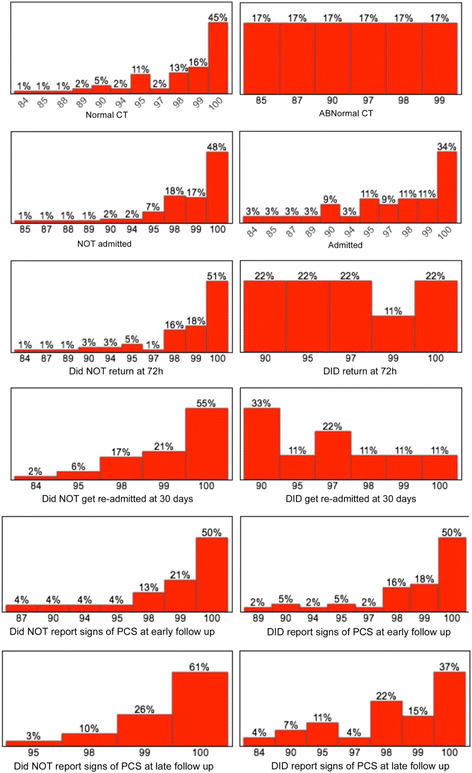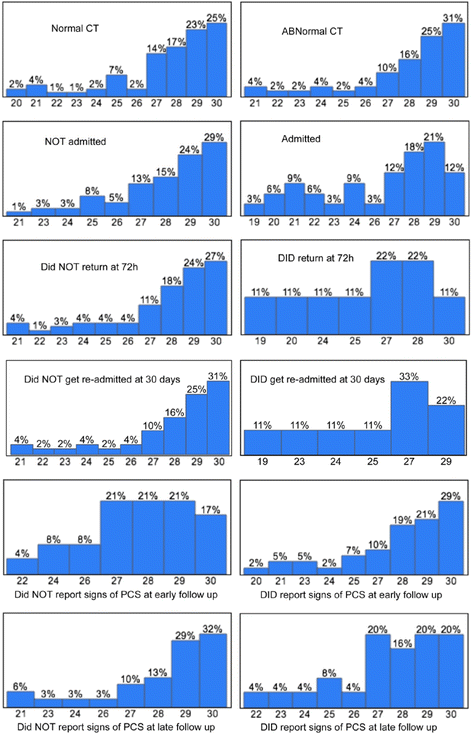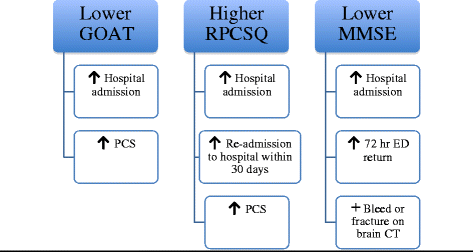The value of neurocognitive testing for acute outcomes after mild traumatic brain injury
- PMID: 27453788
- PMCID: PMC4957408
- DOI: 10.1186/s40779-016-0091-4
The value of neurocognitive testing for acute outcomes after mild traumatic brain injury
Abstract
Background: Traditionally, neurocognitive testing is performed weeks to months after head injury and is mostly performed on patients who continue to have symptoms or difficulties. In this study, we sought to determine whether these tests, when administered acutely, could assist in predicting short-term outcomes after acute traumatic brain injury (TBI).
Methods: This is an IRB-approved prospective study of adult patients who came to the emergency department of our Level-1 trauma center with TBI. Patients were enrolled prospectively after providing written informed consent and underwent three separate neurocognitive tests: the Galveston Orientation Amnesia Test (GOAT) the Rivermead Post-Concussion Survey Questionnaire (RPCSQ) and the Mini Mental Status Examination (MMSE).
Results: A lower GOAT score was significantly associated with hospitalization (P = 0.0212) and the development of post-concussion syndrome (P = 0.0081) at late follow-up. A higher RPCSQ score was significantly associated with hospital admission (P = 0.0098), re-admission within 30 days of discharge (P = 0.0431) and evidence of post-concussion syndrome (PCS) at early follow-up (P = 0.0004). A higher MMSE score was significantly associated with not being admitted to the hospital (P = 0.0002) and not returning to the emergency department (ED) within 72 hours of discharge (P = 0.0078). Lower MMSE was also significantly associated with bleeding or a fracture on the brain CT (P = 0.0431).
Conclusions: While neurocognitive testing is not commonly performed in the ED in the setting of acute head injury, it is both feasible and appears to have value in predicting hospital admission and PCS. These data are especially important in terms of helping patients understand what to expect, thus, aiding in their recovery.
Keywords: Mild traumatic brain injury; Neurocognitive testing; Treatment outcome.
Figures
References
-
- Faul M, Xu L, Wald MM, Coronado VG. Traumatic Brain Injury in the United States: Emergency Department Visits, Hospitalizations and Deaths 2002–2006. Atlanta (GA): Centers for Disease Control and Prevention, National Center for Injury Prevention and Control; 2010.
-
- Langlois J, Rutland-Brown W, Thomas K. Traumatic brain injury in the United States: Emergency department visits, hospitalizations, and deaths. Atlanta: Centers for Disease Control and Prevention, National Center for Injury Prevention and Control; 2004.
LinkOut - more resources
Full Text Sources
Other Literature Sources





